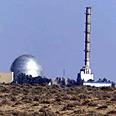
Is there a connection between Benjamin Netanyahu’s upcoming meeting with President Obama at the White House and the surprising statement by the American State Department Tuesday?
If this is the case, then this is (yet another) worrying harbinger from America’s direction and this time in respect to a particularly sensitive matter.
Until today, Israel refused to sign the Non-Proliferation Treaty (NPT) or allow monitoring by the International Atomic Energy Agency (IAEA.)
The NPT was in fact a joint scheme by the great powers to prevent the nuclearization of Germany in the era following World War II. It was a sort of gentlemen’s agreement premised on the assumption that a state usually does not lie. According to the treaty, a state that signs it (Israel, for example, did not sign it) is obligated to report to the IAEA on all details of a nuclear project and refrain from producing nuclear weapons. In exchange, such state is given the legal possibility to deal with all areas of nuclear production for “peaceful purposes.”
Dr. Avner Cohen, an Israeli researcher who resides in the US and specializes in the spread of nuclear weapons, quoted in his book “Israel and the Bomb “ the father of Israel’s atomic project, Ernst David Bergman, who said that there is no such thing as two distinct nuclear paths – one for peaceful purposes and another for military aims. It’s all the same path.
In other words, a state that signs the NPT can reach, with authorization, very close to the stage where it can produce a bomb, without actually building it. Meanwhile, it may enrich uranium, complete the nuclear cycle, separate plutonium, and everything will be done with the IAEA’s knowledge. This way, Germany and Japan can produce sufficient quantity of fissile material for an atomic bomb within a few months.
Dismal Iraqi experience
This deal worked quite well as long as it pertained to states such as Germany and Japan. Yet when less moral gentlemen, such as Saddam Hussein, aimed to join the club, the treaty turned into a joke.
According to the old treaty, IAEA inspectors are not allowed to undertake unannounced visits or enter any facility that had not been declared as related to the nuclear program by the state under supervision. In other words, if a sign reading “industrial plant” was hanging above a nuclear reactor in Iraq, the inspectors would not be allowed to enter.
In the wake of the dismal Iraqi experience, the “Second Protocol” was added, whereby unannounced visits are allowed at undeclared sites as well as other monitoring mechanisms. However, the main vulnerability had not been addressed: A state that agrees to be monitored can reach very close to a bomb, and then complete the remaining steps clandestinely, and relatively quickly.
The need to tighten the control and create a new package reemerged also because more states joined the club or wish to join it (North Korea and Iran, respectively,) and also because in the past six years we have seen a global process of what professional publications refer to as the “nuclear renaissance” and pertains to the dramatic rise in the importance of nuclear energy. It is precisely those environmentalist elements that in the past viewed reactors as the root of all evil who currently believe that these reactors present the potential to resolve at least part of the global warming problem.
Several states would have been very happy to see the world adopting the “Indian deal.” India carried out a public nuclear experiment and did not sign the NPT (just like Israel.) The US reached an agreement with India whereby the Indians separate the military path of nuclear development from the civilian path. The US assists India and greatly upgrades its civilian nuclear capabilities. That way, the US positioned India as a pro-American element and as a strategic power that counter-balances China, which some in the US view as the main problem today.
The question of the Indian agreement currently faces a scathing debate among government, academia, and foreign policy officials in the US. Many members of the Obama administration objected to the Indian deal when they were not in government, and currently seek to amend it.
Ronen Bergman, a correspondent for Israel’s largest daily Yedioth Ahronoth, is the author of the “The Secret War With Iran”















